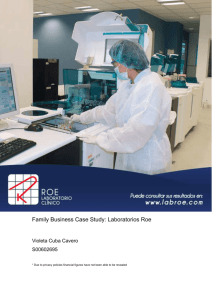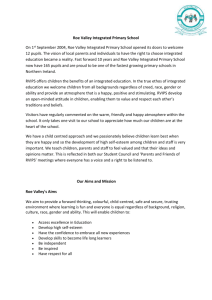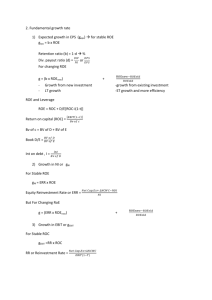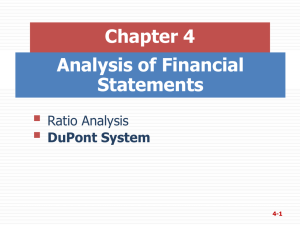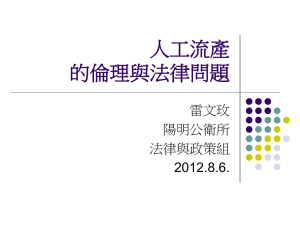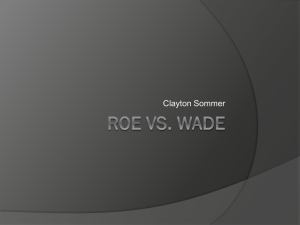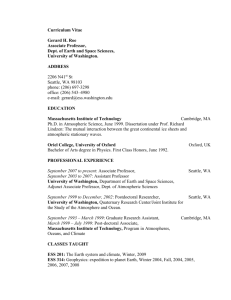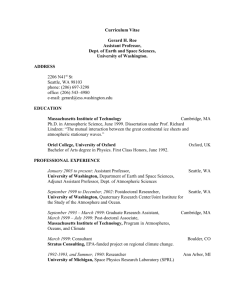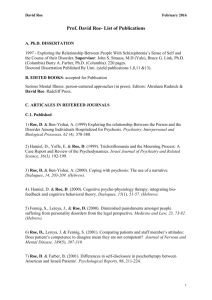Family Business Case Study: Laboratorios Roe - The
advertisement
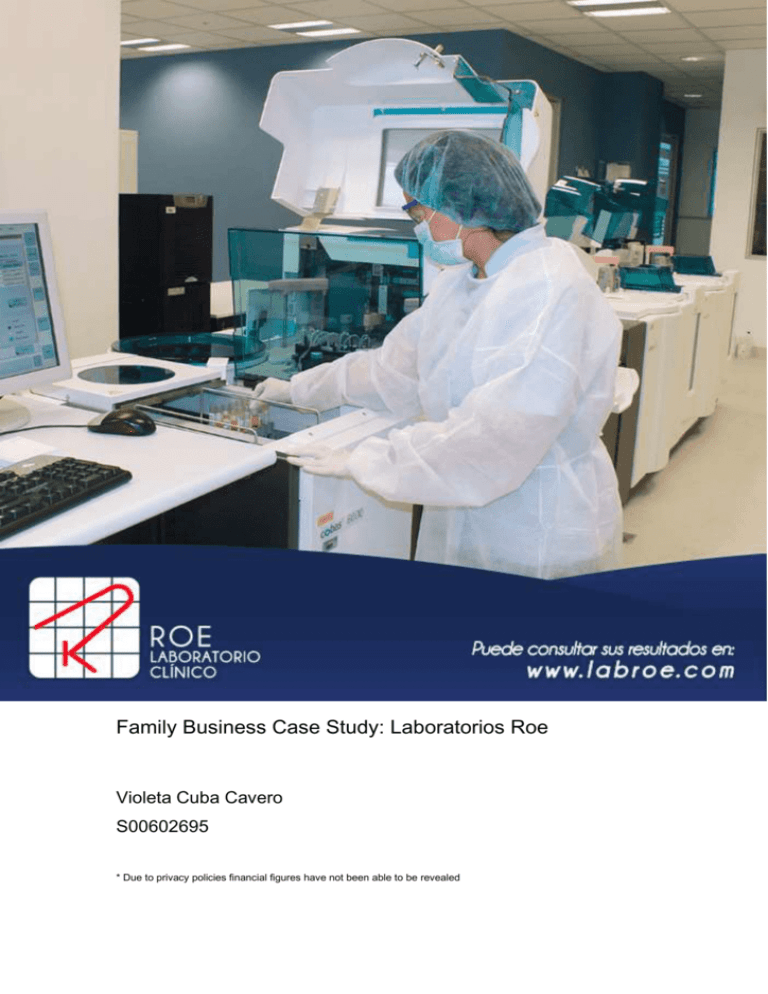
Family Business Case Study: Laboratorios Roe Violeta Cuba Cavero S00602695 * Due to privacy policies financial figures have not been able to be revealed 22nd of March 2013 History In 1953, a Doctor called Carlos Roe Gómez founded Laboratorios Roe in Lima, Peru. At the beginning, it was a general clinical laboratory; nowadays, after more than 60 years, Laboratorios Roe is considered as the first private centre of clinical analysis in the country. Important Dates and Facts In 1962 the Laboratory started to operate in one of the most recognized clinics of Lima: San Felipe Clinic. In this manner, the laboratory had the opportunity to offer their services to patients inside the clinic. Due to the high demand, in 1982 the Laboratory obtained two automated machines for high-volume biochemical analysis technology. These machines are capable of doing 360 different tests per hour. In 1993 the Lab started to offer tests for detection of risk of Down syndrome for pregnant women. In 1997 they launched their web page and in 1998 patients were able to check their results online (Web page: http://www.labroe.com). From 2008 to 2011 they started to open new centres across Lima City. Services offered Since the beginning the company was the pioneer in implementing their service at home across Lima city. Patients can require this service at the comfort of their own home any time, any day. This was specially created to address the needs of old or sick people that were incapable of going directly to a centre. Because the company is always looking for satisfy people’s health needs, Laboratorio Roe offers more than 3,000 different types of analysis (HIV, Hepatitis A-B-C, blood tests, among others) and diagnostics giving as a result an approximately of 750,000 analysis per year. Present Currently, the Laboratory has four diagnostician’s clinical pathologists; one clinical haematologist and over 100 medical technologists specialized in the latest laboratory techniques. Additionally, they are around 180 employees working in the company. Nowadays the company has more than 15 centres located all across Lima and one centre located in on of the main cities of Peru: Arequipa. Strategic Alliances Laboratorios Roe has certain alliances with other Institutes and Laboratories around the world. The purpose of this is to be updated with the latest information about medical technology and certain diseases. Quest Diagnostics Nichols Institute, de California - USA, is their most important alliance. Additionally, the following Laboratories also are part of their alliances: Speciality Labs Baylor DNA Diagnostic Laboratory. UCSD Autism Research Laboratory Immunosciences Lab Inc. Immunolab laboratories. Laboratorio de la Clínica Laboratorio Balagué Center in Spain Mayo en Minesota, Staff Doctors Dr. Carlos Roe Battistini (family member) Dr. Eduardo Roe Battistini (family member) Dr. Jorge Manuel Leiva Beraun (non-family member) Dr. José Gálvez Dañino (non-family member) Dr. Juan Carlos Gomez de la Torre (non-family member) Administrative Sr. Cristian Concha Girardi – General Manager (non-family member) Family involved Currently, two brothers from the second generation, Carlos and Eduardo Roe, own Laboratorios Roe. Each of them has a different shares percentage, which cannot be revealed due to confidentiality. None of the wives of both brothers are involved in the company. Until now, none of their sons or daughters (10 in total) is involved in the business. Family Policies Along with this long trajectory, family members have always preferred to not involve the wives in the business. However, sons or daughters are more than welcome to join the business. At the moment, one of the most important requirements is that any family member who wishes to run the business in the future must be a doctor. What is going to happen next? In ten years or less, members of the second generation will be ready to pass their business to the third generation. However, at the moment any family member is interested yet in taking the business. None of the sons or daughters is a doctor, which will make the succession planning tough giving the fact every family member have been a doctor. On the other hand, the business will continue expanding across the country and take more presence in the market and always with its high quality standards. If Carlos and Eduardo keep on thinking that the next generation who gets in charge of the business should be a doctor, then one of their sons or daughters will have to follow their path. Otherwise, no one know what will happen. Or may be, they will change their mind and let the third generation run the business without medical knowledge. Theories and frameworks Family business can face three different types of challenges, modernising outdated skills, managing transitions and raising capital (Leach, 2007). In this particular case, the second generation considers the business should be run by a certain way, this is, preferable by a doctor. However, it might happen that the third generation prefers to manage the business from an administrative perspective. This might be a significant change that could affect the relation between the family members. Furthermore, family businesses differ from any other business in terms of values, beliefs and behaviours they have. Thus, there are many factors in family’s relationships that can affect the business. An effective way to understand this is looking at the relationship between the family and the business is to see both, family and business, as systems (Leach, 2007). FAMILY Emotion-Based Subconscious behaviour Inward-looking Minimising change Source: Leach, 2007 FRICTION AND CONFLICT BUSINESS Task-based Conscious behaviour Outward-looking Exploiting change The family system is based on shared emotions between family members. While the business system is based on tasks and results. It is possible that in Laboratorios Roe, both brothers share values and emotions and have strong relations with their sons and daughters. However, for them it is crucial that the next generation should have a broad knowledge about medicine and only having a Degree in Business Administration is not enough to run this company and obtain exceptional results as up to date. Questions 1. What will happen if the third generation decides not to follow a medical future? Will Carlos and Eduardo let the third generation to run the business only with a business administration degree? 2. Since the third generation doesn’t have any medical knowledge, it is hard for them to share and understand the way of thinking from a medical point of view. Will the third generation consider studying medicine, so the business doesn’t get affected? 3. Will Carlos and Eduardo agree in hiring a non-family member as a doctor and let the third generation run the business with their current studies? References Datos Peru (n/a) Available at: http://www.datosperu.org/peru-laboratorios-roesa.php (Accessed 20th of March 2013) Directorio empresas (2010) Available at: http://directorioempresas.weboperador.pe/go.php?site=MzU6MjM3OjE2Njgx (Accessed 20th of March 2013) Laboratorios Roe 2012 Company web page. Available at: www.labroe.com (Accessed 20th of March 2013) Leach, P. (2007) Family Businesses The Essentials London: Profile Books Ltd.
